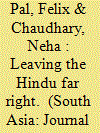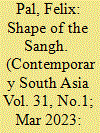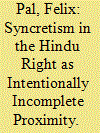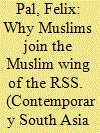|
|
|
Sort Order |
|
|
|
Items / Page
|
|
|
|
|
|
|
| Srl | Item |
| 1 |
ID:
191068


|
|
|
|
|
| Summary/Abstract |
Why do people leave the world’s largest far-right organisation? In this article, we analyse six autobiographical defection accounts of ex-members of the Rashtriya Swayamsevak Sangh (RSS), the apex organisation of the Indian Hindu nationalist movement. Compiled here for the first time, an analysis of these accounts reveals that even the most disciplined and ideologically coherent far-right organisations suffer from internal organisational messiness and attrition. These accounts challenge the unique mythology that surrounds the RSS and gesture towards the methodological possibilities of discarding the ideology-driven analyses of the far right in favour of material analyses of the lives of far-right organisational members.
|
|
|
|
|
|
|
|
|
|
|
|
|
|
|
|
| 2 |
ID:
192305


|
|
|
|
|
| Summary/Abstract |
The Indian Hindu nationalist movement is largely sustained by a network, hundreds of organisations strong, linked in greater or lesser degrees to a central organisational node: the Rashtriya Swayamsevak Sangh. In this paper I propose a new, critical, definition of this network: That which is constituted by organisational sites through which a central executive may exert authority, (a) through existing institutionalised communication channels, and (b) without coercion. By reconfiguring the analytic focus on this network, which I refer to as the Sangh, from its organisational nodes, to the linkages through which power travels, I propose a new research agenda on this Hindu nationalist organisational network that I argue more clearly identifies the spread, intentions and weaknesses of the far-right in India.
|
|
|
|
|
|
|
|
|
|
|
|
|
|
|
|
| 3 |
ID:
184238


|
|
|
|
|
| Summary/Abstract |
Religious syncretism can function as an instrument of inter-group control and domination. Rather than consistently promoting cross-religious forbearance and knowledge, syncretism enables a proximity that allows forms of violence otherwise inaccessible to religious majoritarian groups. By choreographing performances of syncretism between themselves and a subordinate religious community, organizations like the Indian Hindu nationalist Rashtriya Swayamsevak Sangh (RSS) produce an intentionally incomplete proximity. This proximity draws close minority groups like the RSS’ Muslim wing, the Muslim Rashtriya Manch, but without allowing final inclusion or incorporation. Muslim proximity to the RSS becomes a spectacle of humiliation and domination rather than a measure of inclusion into the Hindu right. Muslims must perform Hindu nationalist religious rituals, while denigrating mainstream Islamic tradition. Drawing on extensive interview-based fieldwork with the RSS and the Manch, I argue that syncretism can function as domination because it reinforces ethnic hierarchies, but that this domination is not a form of hierarchical encompassment. Rather, subordinate religious groups are kept in a perpetual humiliating limbo as a way to reify the superiority of a dominant religious group.
|
|
|
|
|
|
|
|
|
|
|
|
|
|
|
|
| 4 |
ID:
176574


|
|
|
|
|
| Summary/Abstract |
The Rashtriya Swayamsevak Sangh (RSS) – the paramilitary corps that animates the contemporary Indian Hindu nationalist movement – increasingly relies on its Muslim wing to bolster its denials of extremism. The RSS claims hold that crowds of Muslims join its Muslim wing, the Muslim Rashtriya Manch, through organic nationalist awakenings that imply tacit acceptance of the RSS’ Hindu nationalist agenda. Based on a year of interview-based research in North and West India with more than 80 Manch members, defectors, critics and leaders, I provide empirical evidence that challenges the claim that the RSS is winning over Muslim minds. Instead, I suggest that Muslims join for largely instrumental reasons; for material reward and security, but also to rebuke traditional Muslim centres of power and to draw close to the charismatic leadership of Manch leader Indresh Kumar. While discussions of motivations are famously fraught, I rely on interviews not to conclusively list membership motivations, but to assess the claims made by the RSS. As Hindu nationalists consolidate and intensify their activities after the 2019 general election, understanding how the RSS does or does not ‘win over’ India’s Muslim communities is necessary groundwork to address the position of minorities in a Hindu nationalist future.
|
|
|
|
|
|
|
|
|
|
|
|
|
|
|
|
|
|
|
|
|